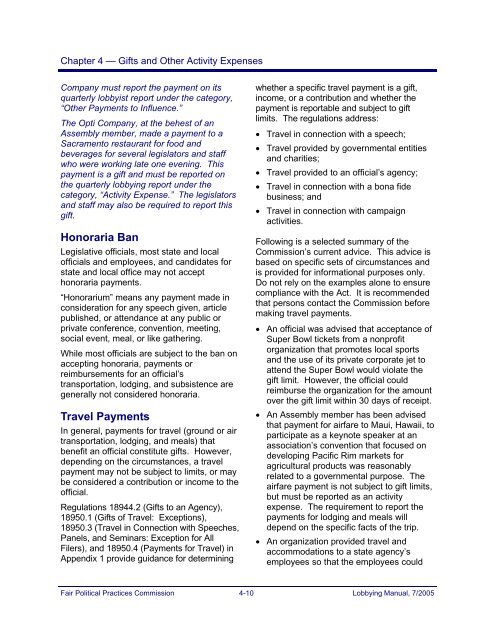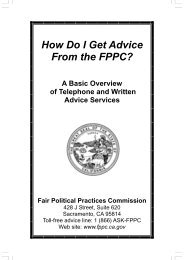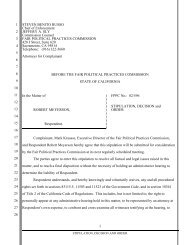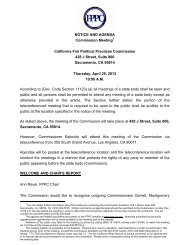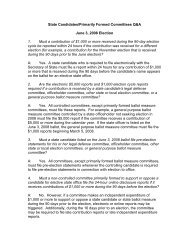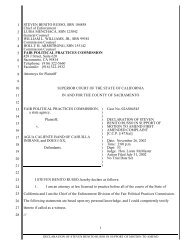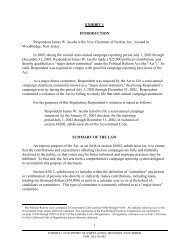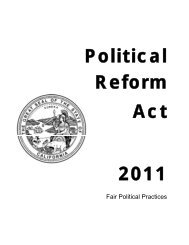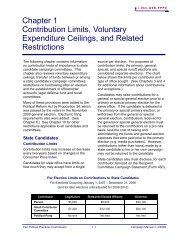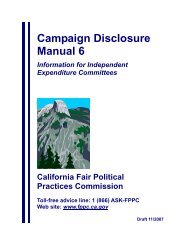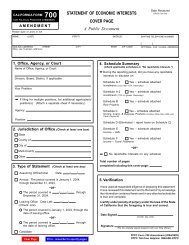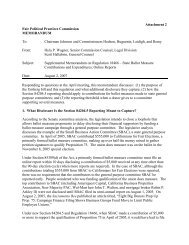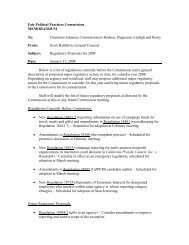Lobbying Disclosure Information Manual - Fair Political Practices ...
Lobbying Disclosure Information Manual - Fair Political Practices ...
Lobbying Disclosure Information Manual - Fair Political Practices ...
Create successful ePaper yourself
Turn your PDF publications into a flip-book with our unique Google optimized e-Paper software.
Chapter 4 — Gifts and Other Activity Expenses<br />
Company must report the payment on its<br />
quarterly lobbyist report under the category,<br />
“Other Payments to Influence.”<br />
The Opti Company, at the behest of an<br />
Assembly member, made a payment to a<br />
Sacramento restaurant for food and<br />
beverages for several legislators and staff<br />
who were working late one evening. This<br />
payment is a gift and must be reported on<br />
the quarterly lobbying report under the<br />
category, “Activity Expense.” The legislators<br />
and staff may also be required to report this<br />
gift.<br />
Honoraria Ban<br />
Legislative officials, most state and local<br />
officials and employees, and candidates for<br />
state and local office may not accept<br />
honoraria payments.<br />
“Honorarium” means any payment made in<br />
consideration for any speech given, article<br />
published, or attendance at any public or<br />
private conference, convention, meeting,<br />
social event, meal, or like gathering.<br />
While most officials are subject to the ban on<br />
accepting honoraria, payments or<br />
reimbursements for an official’s<br />
transportation, lodging, and subsistence are<br />
generally not considered honoraria.<br />
Travel Payments<br />
In general, payments for travel (ground or air<br />
transportation, lodging, and meals) that<br />
benefit an official constitute gifts. However,<br />
depending on the circumstances, a travel<br />
payment may not be subject to limits, or may<br />
be considered a contribution or income to the<br />
official.<br />
Regulations 18944.2 (Gifts to an Agency),<br />
18950.1 (Gifts of Travel: Exceptions),<br />
18950.3 (Travel in Connection with Speeches,<br />
Panels, and Seminars: Exception for All<br />
Filers), and 18950.4 (Payments for Travel) in<br />
Appendix 1 provide guidance for determining<br />
whether a specific travel payment is a gift,<br />
income, or a contribution and whether the<br />
payment is reportable and subject to gift<br />
limits. The regulations address:<br />
• Travel in connection with a speech;<br />
• Travel provided by governmental entities<br />
and charities;<br />
• Travel provided to an official’s agency;<br />
• Travel in connection with a bona fide<br />
business; and<br />
• Travel in connection with campaign<br />
activities.<br />
Following is a selected summary of the<br />
Commission’s current advice. This advice is<br />
based on specific sets of circumstances and<br />
is provided for informational purposes only.<br />
Do not rely on the examples alone to ensure<br />
compliance with the Act. It is recommended<br />
that persons contact the Commission before<br />
making travel payments.<br />
• An official was advised that acceptance of<br />
Super Bowl tickets from a nonprofit<br />
organization that promotes local sports<br />
and the use of its private corporate jet to<br />
attend the Super Bowl would violate the<br />
gift limit. However, the official could<br />
reimburse the organization for the amount<br />
over the gift limit within 30 days of receipt.<br />
• An Assembly member has been advised<br />
that payment for airfare to Maui, Hawaii, to<br />
participate as a keynote speaker at an<br />
association’s convention that focused on<br />
developing Pacific Rim markets for<br />
agricultural products was reasonably<br />
related to a governmental purpose. The<br />
airfare payment is not subject to gift limits,<br />
but must be reported as an activity<br />
expense. The requirement to report the<br />
payments for lodging and meals will<br />
depend on the specific facts of the trip.<br />
• An organization provided travel and<br />
accommodations to a state agency’s<br />
employees so that the employees could<br />
<strong>Fair</strong> <strong>Political</strong> <strong>Practices</strong> Commission 4-10 <strong>Lobbying</strong> <strong>Manual</strong>, 7/2005


